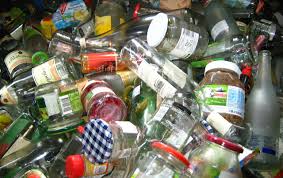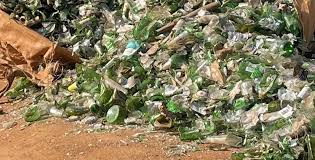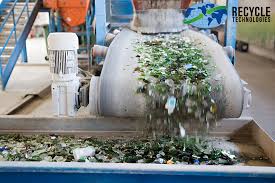![]()
If you’ve landed on this article page, you’re probably searching for a
good business idea—an idea that’s light on the pocket but heavy on
returns, promising both a fulfilling journey and potential profit.
|
How To Start A Lucrative Glass Recycling Business In Nigeria
Glass, scientifically known as “amorphous solid,” is a versatile
and transparent material widely used in various industries and
is formed by melting sand, soda ash, and limestone at high
temperatures.
Across Nigeria and the wider African continent, there is a
growing awareness of the importance of environmental
conservation. People are becoming more conscious of their
consumption patterns and waste disposal habits. This shift in
mindset has opened up avenues for businesses that promote
sustainability, such as the Glass Recycling Business.
One remarkable aspect of the Glass Recycling Business is its
potential for export. Nigeria, with its abundant glass waste,
can tap into a lucrative market by exporting recycled glass to
countries with insufficient local resources. This not only
contributes to the national economy but also supports the
circular economy on a regional scale.
The production yield from raw materials in a Glass Recycling
Business can vary based on factors such as the type of glass,
recycling efficiency, and market demand. Generally, a
significant portion of glass waste is recovered and recycled,
contributing to reduced waste accumulation in landfills and
conserving valuable resources. Glass recycling holds immense
potential in Nigeria and Africa, aligning with global efforts
towards sustainable practices and circular economies.
Collection and Sorting Centers: These businesses focus on
collecting used glass items from households, businesses, and
public areas. They sort glass by color and type for efficient
recycling.
Glass Crushing and Pulverizing: These businesses crush and
pulverize collected glass into small particles or powders that
can be used in various applications.
Glass Bottle Refilling Stations: Refilling stations encourage
the reuse of glass bottles, reducing the need for new glass
production and promoting sustainable packaging.
Glass Artisan Studios: These businesses specialize in creating
unique glass artworks, sculptures, and ornaments using recycled
glass materials.
Glass Product Manufacturers: These businesses produce new glass
products using recycled glass, such as glass containers, tiles,
countertops, and decorative items.
Glass Fiber Production: Recycled glass can be used to
manufacture glass fibers for insulation, textiles, and
construction materials.
Glass Aggregate Production: Businesses in this category crush
glass into aggregate that can be used in construction projects
as a sustainable alternative to traditional aggregates.
Bottle-to-Bottle Recycling: These advanced recycling facilities
process used glass bottles into high-quality glass cullet
suitable for manufacturing new glass bottles.
Upcycling Workshops: These businesses focus on transforming used
glass items into innovative and artistic products, promoting
upcycling and sustainability.
Eco-friendly Packaging Providers: These businesses create
packaging solutions using recycled glass, catering to
environmentally conscious brands.
Glass Bead and Jewelry Crafting: Entrepreneurs can specialize in
crafting glass beads and jewelry using recycled glass materials.
Educational Outreach Organizations: These organizations educate
communities and schools about the importance of glass recycling
and sustainable practices.
Glass Recycling Consulting: Experts offer consulting services to
businesses, communities, and governments looking to establish or
improve glass recycling initiatives.
Waste Management Companies: Integrated waste management
companies incorporate glass recycling as part of their
comprehensive waste reduction services.
Green Building Suppliers: These businesses supply recycled glass
products for green building projects, such as glass countertops
and tiles.
Types Of Glass In Nigeria
Clear Glass Cullet: Clear glass from bottles, jars, and
containers is collected, processed, and recycled into clear
glass cullet. It is used to produce new glass containers and
fiberglass.
Brown or Amber Glass Cullet: Collected from brown or amber glass
containers, this cullet is used to create new brown glass
bottles, reducing the need for raw materials.
Green Glass Cullet: Green glass cullet comes from green glass
bottles and is used to manufacture new green glass containers.
Mixed Color Glass Cullet: This type of cullet results from
combining different colored glass items. It’s used in the
production of various glass products, like countertops and
tiles.
Crushed Glass Aggregate: Glass cullet is crushed into small
pieces and used as an aggregate in construction projects,
including roads and sidewalks.
Glass Beads: Recycled glass is transformed into beads used in
jewelry making, crafts, and fashion accessories.
Glass Wool Insulation: Crushed and processed glass is used to
create glass wool insulation for buildings and industrial
applications.
Glass Fiber Reinforcements: Recycled glass is used to produce
fibers for reinforcing plastics, creating composite materials
for automotive and construction industries.
Decorative Glass Tiles: Recycled glass is melted and molded into
decorative tiles used for interior and exterior design.
Glass Sandblasting Media: Crushed glass is used as an abrasive
material for sandblasting and cleaning surfaces.
Glass Filtration Media: Recycled glass is processed into
filtration media for water treatment and purification systems.
Glass Jewelry and Art: Recycled glass is transformed into
jewelry, sculptures, and artistic creations.
Glass Countertops and Surfaces: Recycled glass is embedded in
cement or resin to create durable and unique countertops and
surfaces.
Glass Landscaping Mulch: Crushed glass serves as decorative
landscaping mulch, adding color and texture to gardens and
outdoor spaces.
Glass Mosaics: Recycled glass is cut into small pieces and used
to create intricate mosaics for interior and exterior
decoration.
How To Start The Glass Recycling Business In Nigeria
Step 1: Market Research and Business Plan: Conduct thorough
market research to understand the demand for recycled glass in
Nigeria and Africa. Create a detailed business plan outlining
your target market, competition analysis, pricing strategy, and
operational plan.
Step 2: Legal and Regulatory Requirements: Register your
business and obtain the necessary licenses and permits from
relevant authorities. Adhere to environmental regulations and
waste management guidelines for glass recycling.
Step 3: Location and Setup: Secure a suitable location with
ample space for glass collection, sorting, and processing. Set
up the required infrastructure, including sorting equipment,
crushers, and storage facilities.
Step 4: Collection and Sorting: Establish a network for
collecting glass waste from households, industries, and
commercial establishments. Implement an efficient sorting system
to separate glass by color and quality.
Step 5: Crushing and Cleaning: Invest in glass crushing machines
to break down glass into smaller pieces. Clean the crushed glass
to remove impurities and contaminants.
Step 6: Melting and Molding: Partner with glass manufacturers or
set up your own glass melting furnace. Melt the cleaned glass to
produce cullet, which can be molded into new glass products.
Step 7: Product Development: Explore various products that can
be made from recycled glass, such as glass bottles, containers,
decorative items, and construction materials.
Step 8: Marketing and Sales: Develop a strong brand identity and
create marketing materials to promote your recycled glass
products. Establish distribution channels to reach retailers,
wholesalers, and direct consumers.
Step 9: Partnerships and Collaborations: Form partnerships with
local governments, waste management agencies, and environmental
organizations to enhance your collection efforts and promote
sustainable practices.
Step 10: Environmental Education: Raise awareness about the
benefits of glass recycling through community outreach programs
and educational campaigns. Encourage responsible waste disposal
and recycling habits.
How To Recycle and Package Glass In Nigeria or Africa
Collection and Sorting of Glass Waste: Establish collection
points in communities, businesses, and public areas to gather
glass waste. Sort the glass by color (clear, green, brown) and
quality to ensure the best outcomes in the recycling process.
Crushing and Grinding: Transport collected glass to recycling
facilities and use specialized equipment to crush and grind it
into small pieces called cullet, making it easier to handle and
melt.
Cullet Cleaning and Purification: Clean the cullet by removing
labels, caps, and other contaminants. Techniques like air
classifiers, vibrating screens, and water baths help achieve
clean and high-quality cullet.
Melting and Refining: Load cleaned cullet into high-temperature
furnaces, where it is melted and refined. This process removes
impurities and adjusts the composition for specific product
requirements.
Glass Blowing and Forming: Transform molten glass into new
products using glass blowing or forming methods. Skilled
artisans shape the glass using molds, blowpipes, and tools to
create items like bottles, containers, and art pieces.
Glass Fiber Production: Use the molten glass to create glass
fibers through extrusion, drawing, and spinning processes. These
fibers find applications in construction and textiles.
Foaming Glass Manufacturing: Introduce foaming agents to molten
glass and subject it to controlled heating to create foamed
glass with insulating properties.
Agricultural and Horticultural Uses: Crushed glass can be
utilized as an alternative to sand in agriculture and
horticulture. It improves soil drainage, retains moisture, and
prevents weed growth.
Decorative and Artistic Applications: Encourage artisans to
create jewelry, decorative tiles, and mosaic artworks using
recycled glass, showcasing its artistic potential.
Glass Aggregate for Construction: Incorporate processed glass
cullet as aggregate in construction materials like concrete and
asphalt, contributing to sustainability and resource
conservation.
Quality Control and Testing: Regularly test recycled glass
products to ensure they meet quality standards and are safe for
their intended applications.
Raw Materials Used To Recycle Glass In Nigeria or Africa
Cullet (Recycled Glass): Cullet is the primary raw material for
glass recycling. It is collected from post-consumer glass
products, such as bottles and containers. Sorting and cleaning
of cullet are essential to remove contaminants like labels and
caps.
Soda Ash (Sodium Carbonate): Soda ash is used as a fluxing agent
to lower the melting point of glass during the recycling
process. It helps in the fusion of cullet and other raw
materials.
Silica Sand: Silica sand provides the basic component of glass,
supplying silicon dioxide (SiO2). It contributes to the
structural integrity and transparency of the glass.
Limestone (Calcium Carbonate): Limestone acts as a stabilizer,
preventing the glass from being soluble in water. It also
assists in controlling the viscosity of molten glass.
Dolomite: Dolomite is added to modify the physical and chemical
properties of glass, enhancing its resistance to heat and
impact.
Alumina (Aluminum Oxide): Alumina is added to improve the
durability and hardness of glass, making it suitable for various
applications.
Coloring Agents: Various metal oxides are used to introduce
colors to glass products. For instance, iron oxide produces
green or brown glass, while cobalt oxide creates blue glass.
Cullet Additives: To enhance the quality of cullet, small
amounts of other materials like ceramics and glass powders may
be added to achieve specific properties.
Glass Fibers: Recycled glass fibers from items like old glass
containers or fiberglass products can be incorporated into new
glass products, improving their mechanical properties.
Foaming Agents: For foamed glass production, foaming agents are
added to create a lightweight, porous material with insulation
properties.
Borax: Borax is sometimes used as a flux to aid in the melting
of glass and reduce its viscosity.
Magnesite: Magnesite can be added to modify the refractive index
and density of the glass.
Antimony Trioxide: This compound is used as a fining agent to
remove tiny air bubbles from the glass.
Recycled Glass Powder: Crushed and ground recycled glass can be
used as a supplementary raw material, contributing to
sustainable glass production.
Types Of Equipment & Tools Used In The Glass Recycling Business
In Nigeria or Africa
Glass Crushers: These machines crush collected glass items into
smaller particles, known as cullet, which is the primary raw
material for glass recycling.
Glass Washers: Glass washers clean and remove impurities from
the cullet, ensuring it’s free from contaminants like labels,
caps, and dirt.
Glass Furnace: A glass furnace melts the cleaned cullet at high
temperatures to create molten glass that can be formed into new
products.
Glass Forming Machines: These machines shape the molten glass
into desired forms, such as bottles, jars, and containers,
through processes like blowing or pressing.
Annealing Oven: After forming, glass products are slowly cooled
in an annealing oven to relieve internal stresses and increase
their strength.
Glass Inspection Equipment: These devices check the quality and
integrity of the glass products, detecting any defects that
might affect their usability.
Coloring and Coating Equipment: For producing colored or coated
glass products, equipment like coloring mixers and coating
applicators are used.
Glass Cutting Machines: Glass cutting equipment shapes glass
products into specific dimensions, facilitating customization
and efficient use.
Glass Edge Processing Tools: These tools grind and polish glass
edges, ensuring they are smooth and safe for handling.
Glass Packaging Machinery: Machines for packaging and labeling
recycled glass products for distribution, such as filling and
capping equipment.
Palletizing Systems: These systems arrange packaged glass
products onto pallets for storage and transportation.
Forklifts and Conveyors: Forklifts and conveyor belts are used
to move and transport glass products within the facility.
Baling Machines: Baling machines compress and bind waste glass,
like broken glass pieces, for ease of storage and transport to
recycling facilities.
Delivery Vehicles: Trucks or vans are essential for distributing
recycled glass products to customers across Nigeria and Africa.
Recycling Collection Bins: Strategically placed bins encourage
the collection of glass items from households and commercial
establishments, ensuring a steady supply of raw material.
The Glass Recycling business in Nigeria and Africa presents a
promising avenue for addressing environmental concerns while
also contributing to economic growth. Despite the challenges
such as inadequate infrastructure and public awareness, the
potential for positive impact is significant.
As local governments and communities collaborate to build robust
recycling ecosystems, glass recycling can become a catalyst for
sustainable development. Through increased education, improved
collection systems, and the development of local markets for
recycled glass products, this industry can create jobs, conserve
resources, and mitigate the negative environmental effects of
glass waste. It is essential for stakeholders to align efforts,
invest in technological advancements, and advocate for
supportive policies to realize the full potential of glass
recycling.
By embracing the opportunities presented by the Glass Recycling
business, Nigeria and Africa can lead the way toward a greener
and more sustainable future.
Get our Practical Guide on How to start Glass Recycling business in Nigeria. This comprehensive guide will walk you through the fundamentals of starting and running a successful Glass Recycling Business in Nigeria, from initial planning to profitability. We’ll cover key factors like identifying in-demand niches, establishing a strong brand, marketing effectively, optimizing operations and delivering an exceptional student experience.
|







